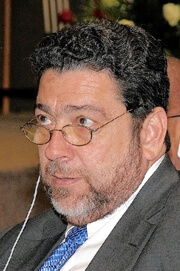When Caribbean Community leaders gathered in the Eastern Caribbean Island of St. Vincent this week, two rather new but proverbially sexy items were on the agenda for discussion, one dealing with a plan to make Europe pay the region for enslaving Blacks and the other the mounting pressure leaders are feeling from a plethora of quarters to legalize marijuana at least for medical use.
By the time current chairman and host Prime Minister Ralph Gonsalves had sounded the gravel to end two-full days of discussions at the mid-year summit, the leaders in a landmark move had decided to agree in principle to decriminalize medical marijuana use, given evidence from regional and other researchers about its benefits to patients with various illnesses.
As Gonsalves himself pointed out, it would have been a virtual impossibility for such an item to be placed on a Heads of Government meeting 10 years ago, noting the fact that it did make it was a realization of changing times in the trading group and around the world.
“It’s an idea, the time of which has come,” Gonsalves noted, suggesting that “we cannot continue frankly with the drug policies that we have had over the years. I am not talking about legalizing marijuana. The discussion is about decriminalization in respect of medical marijuana and very small quantities regarding use for social and religious purposes but not to be made available for anyone under the age of 18,” he said.
But the man who helped to drive the discussion perhaps more than anyone else and ensure it was a full agenda item, also suggested that the harsh, if not heartless laws on the books in many of the 15-member states regarding the use of small amounts, should be reviewed, as it makes no sense in a modern and changing world.
In this regard, Kamla Persad-Bissessar, the prime minister of Trinidad who handed over the chairperson’s gavel to Gonsalves in the past week, said that while the leaders have decided on the new way forward, most if not all will have to deal with local cultural and political realities once they return home.
“It is being done in other countries, it is being done with some states in the United States and it is definitely something that is worth considering for medical purposes. The next step is private use in small amounts and where does it end, where does it go? I don’t think as a responsible politician I would want to commit without getting consent from the people of Trinidad and Tobago on that issue,” the prime minister told reporters in St. Vincent.
The leaders had asked the Guyana-based bloc headquarters to prepare a concept paper to drive discussions. One point it clearly made in the document leaders reviewed in St. Vincent was that the region could rake in millions from medical marijuana products if it decides in a rational way how the issue will be tackled.
On this, Gonsalves wasted no time in pointing out that the American State of Colorado had already earned $2M in sales taxes since the narcotic was declared legal to use in recent months, giving a strong hint of where the discussion will likely head next while experts deal with law revisions and set limits as to who qualifies to use the drug and who does not.























